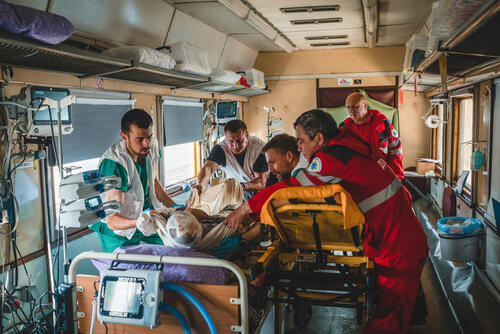DRC: MSF teams respond as 74,000 displaced by North Kivu clashes
Violent clashes have forced tens of thousands of people from their homes and into makeshift camps in the east of the Democratic Republic of Congo (DRC).
They have fled renewed fighting between the Congolese army and the March 23 movement (M23) around the town of Rutshuru in the province of North Kivu – an area of the DRC long affected by conflict and insecurity.
Médecins Sans Frontières / Doctors Without Borders (MSF) is now calling for an urgent response from humanitarian organisations to meet the huge needs.
Kanyaruchinya camp
Many of the newly-displaced people fled towards Goma, the provincial capital, and are now sheltering in and around Kanyaruchinya camp, situated along the road.
The camp was already home to thousands of people displaced by previous rounds of fighting, as well as people affected by the May 2021 volcanic eruption of nearby Mount Nyiragongo.
Living conditions were already extremely precarious, and the arrival of a new wave of displaced people has now significantly increased the needs of those living there.
“In just a few days we have seen thousands of people quickly build shelters of eucalyptus branches and leaves collected in the surrounding forest, all whilst it is raining,” says Dr Maria Mashako, medical coordinator for MSF in the DRC.
“The families have only brought the bare necessities with them as they fled. They lack everything: healthcare, shelter, food, water and toilets. These vital needs need to be met urgently in order to limit the negative impacts on these people’s health.”
Tripled in a weekend
According to authorities, as of 3 November, at least 74,000 people need aid just outside of Goma following these latest mass displacements.
However, it remains difficult to know exactly how many people have arrived in the last few days, as the arrivals have been so numerous and sudden.
“Some sites where we go regularly were empty only two weeks ago and now are full to bursting. Judging by what we can see, the people of Kanyaruchinya seem to have tripled in the space of a weekend,” says Maria.
The newly-arrived families have settled wherever they can, including in schools, leading to a makeshift cohabitation between students and the displaced people.
“We walked for more than 15 hours to get to Kanyaruchinya,” says Jean-Claude, who fled fighting in Rugari.
“Now we are here with our neighbours behind the school in Mugara, without anything.”
His new neighbour, Justin, who also recently arrived with his family from Kibumba, sadly summed up the situation:
“We fled anxiety and found here distress.”

Overwhelming needs
At the Kanyaruchinya health centre, which is supported by MSF, the number of consultations has increased dramatically from an average of 80 per day in October to 250 now.
To respond to these increasing medical needs, MSF is increasing support for the centre’s medical team, allowing them to continue treating patients 24 hours a day.
MSF has been supporting the centre here since July, providing free and quality healthcare to displaced people, those affected by the volcanic eruption, and the wider community in the area.
Respiratory infections, diarrhoea, and skin infections are the conditions most commonly treated by the team. Since July, over 10,000 consultations have been undertaken at the healthcentre, more than two-thirds of which have been for displaced people.
Faced with the serious lack of humanitarian organisations present in the last few months, MSF has also been providing water to people now living at the many displacement camps in the area.
“The crowded camps and the poor hygienic conditions within them mean that waterborne diseases, like cholera, are likely to spread, as well as other epidemic illnesses,” says Maria.
“Since the weekend of October 29-30, we have doubled our distributions of drinking water. We are now delivering 200,000 litres of water per day across more than ten sites.
“Despite that, our action is limited when compared to the scale of the needs.”
A complex crisis
The intensifying rains in the last few weeks have made the already precarious living conditions worse, exposing people to conditions such as respiratory infections and malaria. Improving access to decent shelter is therefore a priority.
The lack of food is also worrying: without access to their fields and a source of income, the majority of families are now dependent on humanitarian aid to eat.
On top of all this, displaced people—particularly women—face an increased risk of violence.
“Since the beginning of our work in Kanyaruchinya we have treated nearly 120 people who have been victims of sexual violence, more than 80 percent of whom have been displaced people,” says Maria.
“The majority of survivors come to the centre within 72 hours and tell us that they were attacked on the road while looking for food and wood to burn for heat.
“At this moment, it is crucial that the promises other humanitarian organisations have made turn into concrete interventions, including organisations in the field of protection, and that they come to help these people in need.”
Across the North Kivu region, MSF teams are also present in Rutshuru, Binza, Kibirzi, and Bambo, where they continue to offer vital medical assistance to communities, while also evaluating how to support the needs of newly displaced people
Before the new wave of mass displacements, clashes between the Congolese army and M23 had already forced at least 186 000 people from their homes since March 2022.
Now, tens of thousands more people have added to that figure.


